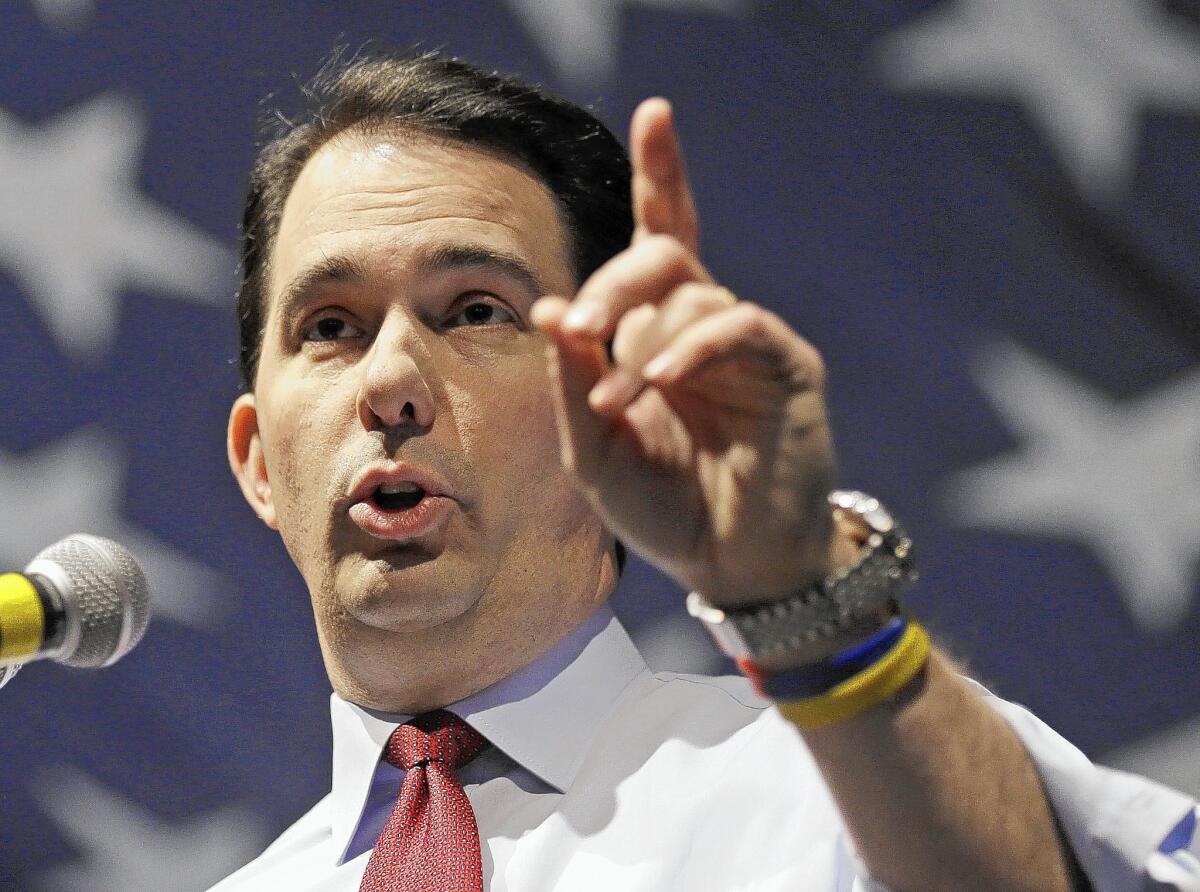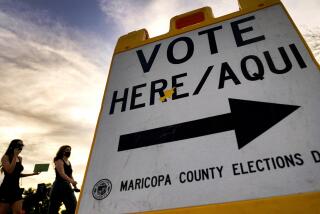Court upholds Wisconsin collective bargaining and voter ID laws

Wisconsin Republican Gov. Scott Walker in May. The state Supreme Court handed the governor two victories Thursday.
The Wisconsin Supreme Court backed Gov. Scott Walker on Thursday in the key areas of labor relations and voter identification, handing the Republican governor victories during this yearâs fiercely contested election.
In one ruling, the court upheld the constitutionality of the stateâs tough law that hobbled collective bargaining rights for most public employees, supporting Walker, who used the law to climb to national political prominence.
In other cases, the court approved the constitutionality of state requirements that people show photo identification before being allowed to vote. That law was challenged in federal court and lost; it is on hold pending appeal.
Walker, who is embroiled in what the polls say is a close reelection bid, proposed reducing the collective bargaining rights as part of an economic reform movement to bring government finances back under control. The effort led to weeks of noisy demonstrations at the Capitol in 2011, the flight of Democratic lawmakers to Illinois in the hope of blocking legislation by denying needed quorums, and eventually a statewide recall effort that Walker survived.
In a 5-2 ruling, the court upheld Walkerâs law, which, among other things, prohibits public worker unions from bargaining for anything beyond base wage increases tied to inflation.
âNo matter the limitations or âburdensâ a legislative enactment places on the collective bargaining process, collective bargaining remains a creation of legislative grace and not constitutional obligation. The 1st Amendment cannot be used as a vehicle to expand the parameters of a benefit that it does not itself protect,â Justice Michael Gableman wrote for the majority.
In a statement, Walker, who is also a potential aspirant for the 2016 GOP national ticket, touted his victory. The state maintains that the law has allowed sizable cost savings through cuts in public employee benefits, and changes to insurance and some work rules, including overtime.
âAct 10 has saved Wisconsin taxpayers more than $3 billion,â Walker said. âTodayâs ruling is a victory for those hard-working taxpayers.â
Walker unveiled the bill shortly after taking office in 2011. The move led to efforts in other Midwestern states run by Republicans to curb the power of unions, often allied with Democrats. The unions and Democrats, after losing on policy, fought back, hoping to win politically. By 2012, Walker had been pushed into a recall election against the same candidate he had defeated earlier. In the June 2012 special election, Walker again triumphed and became the first governor to survive a recall election.
On voting regulations, the court backed the photo requirement strongly pushed by Walker. The issue of who gets to vote and under what circumstances goes to the heart of the political process, especially in the current election cycle on the federal level, in which the GOP is seeking to retain control of the House of Representatives and win the Senate.
In general, Democrats have sought to increase the voting base and oppose many regulations, arguing that they discriminate against minorities and the elderly, both key constituencies. Republicans argue that tighter controls are needed to protect the electoral process from voter fraud.
According to the National Conference of State Legislatures, 34 states have passed laws requiring some sort of identification from voters, but only 31 of them are in effect. As in Wisconsin, a court struck down Pennsylvaniaâs law, which is also on hold. North Carolinaâs law wonât take effect until 2016.
In April, U.S. District Judge Lynn Adelman struck down Wisconsinâs photo identification law, arguing that the state couldnât prove the danger of fraud and that the law violated the U.S. Constitutionâs guarantee of equal protection. That case is pending before the U.S. 7th Circuit Court of Appeals.
More to Read
Sign up for Essential California
The most important California stories and recommendations in your inbox every morning.
You may occasionally receive promotional content from the Los Angeles Times.











